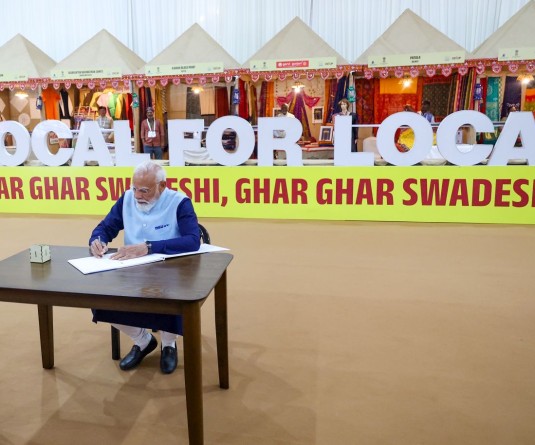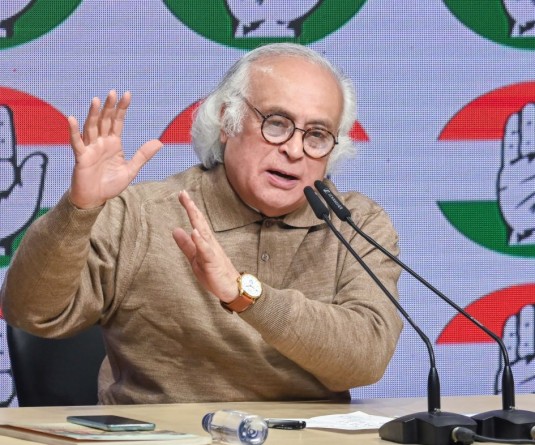
NEW Delhi, January 20 (WSJ): India's food inflation slowed in the week to Jan. 8 as vegetable prices cooled, but the central bank is likely to raise its key interest rates at next week's policy meeting as price pressures still remain high.
The food articles index based on wholesale prices declined 1.2% to 190.6 in the week to Jan. 8 from a week earlier, according to data from the Ministry of Commerce and Industry. The annual inflation rate eased to 15.52% from 16.91% the week before, the second consecutive weekly fall.
The slowing food inflation indicates the government's steps to boost vegetable supplies, especially of onions, are beginning to show results and will also help anchor inflation expectations.
Finance Minister Pranab Mukherjee said food prices are declining, although they are at an elevated level. He said the government will take "all appropriate steps" to quell the price pressure.
Mr. Mukherjee said also he will review the situation with Reserve Bank of India Governor D. Subbarao Friday.
The RBI will meet Tuesday to review its monetary policy and is widely expected to raise interest rates by 0.25 percentage point. Some economists said a 0.50 percentage point hike also can't be ruled out, although the downward trending food inflation will diminish its chances.
"The trend is good and we can expect food inflation to come down as the government's measures will begin to reflect in the upcoming data," said Nitesh Ranjan, an economist at state-run Union Bank of India.
Food inflation accelerated for five consecutive weeks to Dec. 25, fueled by rising prices of vegetables, especially onions, after unseasonal showers damaged crops and shrunk supplies.
The government banned exports of onion, a key ingredient in Indian cuisine, removed its import tax and directed two state-backed cooperatives to sell the vegetable at subsidized rates.
Thursday's data show vegetable prices fell 3.6% although onion prices, which are measured separately, were up 14.8% from a week earlier. Year-on-year, vegetables were 65.4% costlier, while onion prices rose 98.2%.
Higher vegetable prices caused a temporary reversal in easing general inflation, which accelerated in December to 8.43% year-on-year from 7.48% in the previous month.
The government's steps may bring quick relief from a supply shock, but structural issues continue to cloud the medium-term trend in prices, Mr. Ranjan said. "Food inflation will remain a concern, particularly when we have a lot of rural growth initiatives like the NREGA [National Rural Employment Guarantee Act] that will increase demand for food articles."
The NREGA has increased rural income as it guarantees hundred days of employment in a year to rural households whose adult members are ready to do unskilled manual work.
Namrata Padhye, an economist at IDBI Gilts, said the RBI will raise its policy rates by at least 25 percentage point next week as inflation is well above its comfort zone.
"Food prices will gradually come down, but one has to see if that helps the headline inflation numbers," she said. "Global commodity prices will be the major concern now," she added.
Rising global commodity prices, particularly of crude oil--India's largest import item--on top of intense domestic demand pressures could keep inflation at elevated levels through 2011. Most economists predict inflation in the 6.5%-7.5% range by the end of the current financial year in March, far higher than the 5.5% RBI estimates.
Thursday's data also showed that the index for primary articles fell 0.5% to 193.1 in the week to Jan. 8 from 194.0 in the previous week. It was up 17.03% from a year earlier, after climbing 17.58% in the prior week.
The index comprises food and non-food articles as well as minerals.
The food articles index based on wholesale prices declined 1.2% to 190.6 in the week to Jan. 8 from a week earlier, according to data from the Ministry of Commerce and Industry. The annual inflation rate eased to 15.52% from 16.91% the week before, the second consecutive weekly fall.
The slowing food inflation indicates the government's steps to boost vegetable supplies, especially of onions, are beginning to show results and will also help anchor inflation expectations.
Finance Minister Pranab Mukherjee said food prices are declining, although they are at an elevated level. He said the government will take "all appropriate steps" to quell the price pressure.
Mr. Mukherjee said also he will review the situation with Reserve Bank of India Governor D. Subbarao Friday.
The RBI will meet Tuesday to review its monetary policy and is widely expected to raise interest rates by 0.25 percentage point. Some economists said a 0.50 percentage point hike also can't be ruled out, although the downward trending food inflation will diminish its chances.
"The trend is good and we can expect food inflation to come down as the government's measures will begin to reflect in the upcoming data," said Nitesh Ranjan, an economist at state-run Union Bank of India.
Food inflation accelerated for five consecutive weeks to Dec. 25, fueled by rising prices of vegetables, especially onions, after unseasonal showers damaged crops and shrunk supplies.
The government banned exports of onion, a key ingredient in Indian cuisine, removed its import tax and directed two state-backed cooperatives to sell the vegetable at subsidized rates.
Thursday's data show vegetable prices fell 3.6% although onion prices, which are measured separately, were up 14.8% from a week earlier. Year-on-year, vegetables were 65.4% costlier, while onion prices rose 98.2%.
Higher vegetable prices caused a temporary reversal in easing general inflation, which accelerated in December to 8.43% year-on-year from 7.48% in the previous month.
The government's steps may bring quick relief from a supply shock, but structural issues continue to cloud the medium-term trend in prices, Mr. Ranjan said. "Food inflation will remain a concern, particularly when we have a lot of rural growth initiatives like the NREGA [National Rural Employment Guarantee Act] that will increase demand for food articles."
The NREGA has increased rural income as it guarantees hundred days of employment in a year to rural households whose adult members are ready to do unskilled manual work.
Namrata Padhye, an economist at IDBI Gilts, said the RBI will raise its policy rates by at least 25 percentage point next week as inflation is well above its comfort zone.
"Food prices will gradually come down, but one has to see if that helps the headline inflation numbers," she said. "Global commodity prices will be the major concern now," she added.
Rising global commodity prices, particularly of crude oil--India's largest import item--on top of intense domestic demand pressures could keep inflation at elevated levels through 2011. Most economists predict inflation in the 6.5%-7.5% range by the end of the current financial year in March, far higher than the 5.5% RBI estimates.
Thursday's data also showed that the index for primary articles fell 0.5% to 193.1 in the week to Jan. 8 from 194.0 in the previous week. It was up 17.03% from a year earlier, after climbing 17.58% in the prior week.
The index comprises food and non-food articles as well as minerals.






